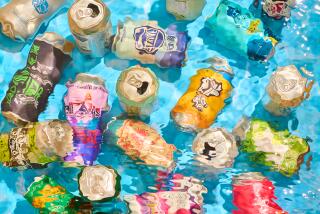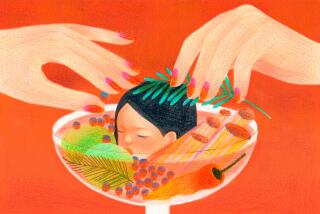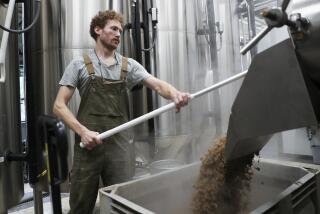Grandpa’s Beer: What’s Old Is Brewed Again
- Share via
ALBANY, N.Y. — A line of taps pouring elegant brews such as Bass and Blue Moon beckons twentysomethings packed into Bomber’s bar. But 21-year-old Elliot Cunniff orders something homier for himself and a friend.
“Two Yuenglings,” he tells the bartender, explaining the attraction after a sip from his pint glass.
“Price. Color. Flavor,” he says. “And the name alone.”
Cunniff doesn’t come out and say it, but it becomes apparent as other Yuengling orders roll in: Old-school brews are cool.
Just as young consumers might wear 1970s-style sneakers, sip 1950s cocktails or download 1980s hair band tunes, many are bellying up to the bar for the beers their grandpas drank -- maybe a Rheingold, a Leinenkugel’s or a Utica Club.
They’re sometimes called “retro beers,” brands that might bring to mind old men in ribbed undershirts and that are now finding a new audience with the young. It worked for Pabst Blue Ribbon, and now others are playing the same nostalgic chords.
Getting new life from an old brand is a great deal for brewers because they avoid the cost of launching a new product. The trick is doing it right. Heavy-handed ads can backfire. Word of mouth seems to work. Television commercials with the Swedish bikini team are a big no-no.
“That’s the whole point of the retro thing, I think,” said Eric Shepard of Beer Marketer’s Insights. “The harder you try to push it, the more skeptical people are going to get.”
These are not the happiest days for brewers. Sales are growing slowly and beer is losing ground to spirits as more people turn to mixed drinks. Beer’s market share dropped from 56% in 1999 to 52.9% last year, according to the Distilled Spirits Council of the United States.
Among the recent bright spots was the quirky story of Pabst, which caught on early this decade with young hipsters in Portland, Ore., and saw its popularity spread out. Without initial prompting, “PBR” became a symbol of authenticity and cool. It has been enjoying double-digit growth every year since 2003, Pabst brand manager Neal Stewart said.
Consumers like these beers in part because they cost less than fancy imports or craft brews. They also can play on happy memories of simpler days -- maybe of their granddad swigging a beer while barbecuing, said Darrell Jursa, managing partner with Liquid Intelligence Inc., a Chicago marketing agency that has Pabst as a client.
Jursa also says that what you drink can be a label for you. Just like a club hopper ordering Grey Goose vodka could be signaling she’s like the urban sophisticates of “Sex and the City,” a Pabst drinker could be showing he is beyond the mainstream.
“You can pay a couple of bucks and you can hold a can in the air and it’s a badge: ‘I’m retro and I’m cool and I’m chic,’ ” Jursa said.
The challenge for brewers is to tap into that anti-establishment streak without seeming too establishment. Pabst managed by tailoring marketing to its young drinkers. It sponsored skateboarding film premieres, Vespa scooter rallies and art gallery openings.
“I had guys get in my face and tell me if we ever advertised on TV, they’d beat me up,” Stewart said.
Although Stewart doesn’t think the Pabst playbook would work for every brand, other brewers are trying to capitalize on their own venerable names. Pabst’s stable of brands also includes Seattle-based Rainier, which is running the nostalgia-soaked “Remember Rainier” campaign (the website suggests enjoying a retro can to the sounds of Led Zeppelin or Pink Floyd).
Leinenkugel’s, made by a Wisconsin-based subsidiary of Miller Brewing Co., introduced retro packaging this year. Even Anheuser-Busch Cos. rolled out a series of retro Budweiser cans this year and recycled a 1956 commercial featuring a crooning nightclub quartet.
One brand that hopes lightning can strike again is Utica Club in upstate New York.
Once a big seller in the Northeast, the brand was down to selling 100,000 cases annually just a few years ago. Most Utica Club drinkers were 55-plus. Then, Pabst-like, it picked up with younger people. Sales are up 9% from last year, said Fred Matt, vice president of Matt Brewing Co. in Utica, N.Y.
“All of the sudden we’re getting calls on a weekly basis: ‘Where can I find Utica Club?’ ”
Matt said the company was contemplating a modest ad campaign that could resurrect old jingles in bars and a cable TV commercial. Nothing too much, though -- the company doesn’t want to kill the positive buzz.
“More than anything,” Matt said, “we’re just letting it go by word of mouth.”
Rheingold, a resurrected New York brand, brought back the Miss Rheingold competition, a popular promotion from the 1940s through the 1960s, as it tried to win over “culture drivers” -- i.e., cool people -- in trendy city neighborhoods.
“You look at what the big beers are doing and you don’t want to fall into that sort of same theme, where you don’t really stand out,” said Norm Snyder, chief operating officer of Rheingold Brewing Co.
Snyder said making Rheingold retro was not the company’s main goal; rather, it was making the name synonymous with New York.
Similarly, while Pottsville, Pa.-based Yuengling, which claims on its website to be America’s oldest brewery, might advertise on progressive rock stations in one market, its commercials might be broadcast between Sinatra songs elsewhere, Chief Operating Officer David Casinelli said.
More to Read
Eat your way across L.A.
Get our weekly Tasting Notes newsletter for reviews, news and more.
You may occasionally receive promotional content from the Los Angeles Times.










